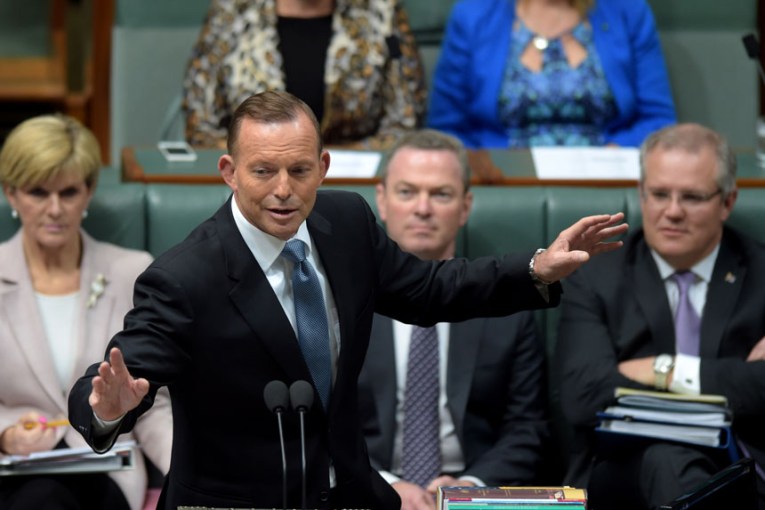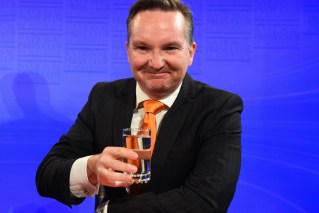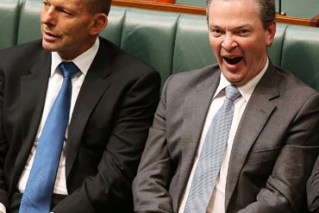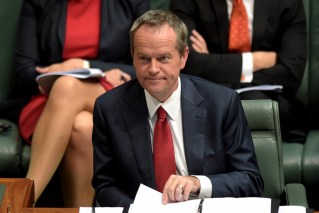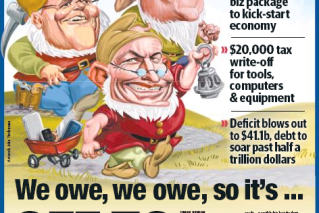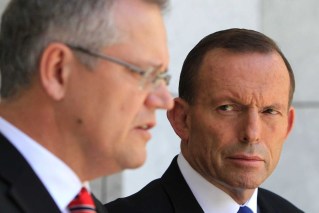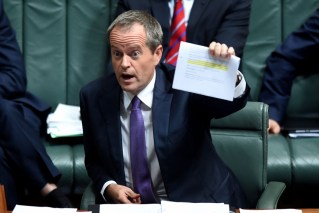Budget leaves families scraping for loose change
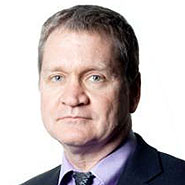
In Biblical terms, the Abbott government’s second budget giveth but it also taketh away.
Consider the $3.5 billion childcare package, which is linked to taking money away from families through scrapping some family tax benefits and stopping what it calls “double dipping” on parental leave.
Analysis from the Australian National University’s Crawford School of Public Policy says that getting the Senate to pass four stalled changes to family payments will save $9.4 billion over four years.
• Joe Hockey: will you still love me in the morning?
• ‘Promising fairness, delivering incompetence’
• The most brutal post-budget interviews
• In a rush? Here’s your brief guide to the budget
The director of the Crawford School’s social policy institute, Peter Whiteford, says the government would save about $1 billion over four years from the existing PPL scheme and around $60 million a year by abolishing the supplement paid to families with four or more children.
“So overall, the Budget proposals would take far more out of assistance for families than it puts in,” Professor Whiteford argues.
“More significantly, the stalled proposals include ending Family Tax Benefit Part B when the youngest child is of school age, a proposal which would see low-income couples on benefits lose around $3000 per year and low-income lone parents on Newstart lose around $2200 if they had one child.
“Increasing employment among low-income families is very desirable, but those unable to find jobs would suffer very large reductions in their incomes if these proposals were to pass.”

Joe Hockey delivers the budget on Tuesday night.
The childcare package is partly funded by changes to paid parental leave. As things stand, mothers can get parental leave payments from the both government PPL scheme and from their employer’s scheme, if there is one.
The government has suggested that getting both forms of PPL is “double dipping” and is somehow akin to rorting the system.
But the government scheme was always intended to set a floor, being 18 weeks’ leave at the minimum wage or around $11,500. It was always intended to be supplemented by employer PPL schemes where possible.
The Australian Council of Social Services has welcomed parts of the budget, like the changes to the pension assets and income tests and support for unemployed youth, but reckons that low-income families are still doing much of the lifting.
Furthermore, ACOSS chief executive Cassandra Goldie argues that the government needs to overhaul superannuation.
“Tax reform must be the next priority for responsible, fair and measured action. This Budget should have begun the work to safeguard the social safety net into the future, by trimming unfair tax concessions for superannuation and reforming negative gearing and capital gains tax breaks,” she said.
“Now is the time for the Government to lead a staged reform process to secure a sustainable revenue base and enable investment in essential social and economic infrastructure.”
On the spending side, the biggest winners are clearly the small business sector, which gets $5.5 billion in tax breaks.
So, the Coalition has replaced their shrill insistence in 2014 that Australia faced a budget crisis – and needed a budget to suit – with economic stimulus.
What has changed? Being in government.
The Coalition scoffed when Labor decided to spend in order to fend off the Global Financial Crisis and tried to argue that international events were hurting Australia’s finances.
Now, without even blushing, Tony Abbott and Joe Hockey argue that they need to stimulate the economy due to international events, like the fall in iron ore prices.
Both sides are now Keynsian (small stimulus boost+fairness) on Budget. What is fun to watch is their continued desperation to be different.
— Rob Oakeshott (@RobOakeshott1) May 13, 2015
Most economists see the budget’s economic growth forecast as being rubbery, with a particular twang around the suggestion that GDP will recover to 3.25 per cent in 2016-17.
In the meantime, nobody much is disputing that below-trend GDP growth means that the unemployment rate is still expected to drift up to 6.5 per cent in 2015-16.
But will the tax breaks for small business help create jobs?
Labor’s much-derided boost for spending on schools during the GFC was at least, doing something tangible.

Bruce Billson described the small business package as “delightful” and “delicious”. Photo: AAP
Now, I have nothing against small business, but they are not the only ones who are “having a go”. So are working families who have traditional job (or are looking for one).
Yet there’s something else about these paeans of praise for small business being the engine room of the economy and job growth.
Listen to Mr Abbott and Mr Hockey and you might get the impression that public sector jobs are somehow inferior, even negligible in the scheme of things – with the exception of the armed services, border protection types and spies.
Indeed, the Coalition regularly equates small government with good government. But voters want teachers and nurses and police. And, yes, voters need public servants even if they don’t always realise it.
Public sector workers do contribute to the economy. But perhaps more importantly, they contribute to society.
Overall, the Budget has the whiff of clearing the ground for an early election, if the Coalition decides to make a dash for a second term.
There might be two million small businesses, most of which are deserving of support. But there are 10 million in the Australian workforce and they get to vote.
